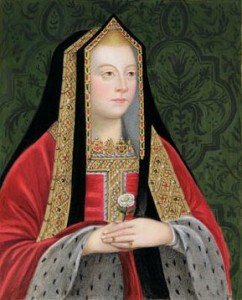 On 11th February 1466, Elizabeth Woodville, wife of King Edward IV, gave birth to the couple’s first child at Westminster Palace. The baby girl was baptised in St Stephen’s Chapel in Westminster Abbey, with the Earl of Warwick standing as godfather and her grandmothers, the Duchesses of York and Bedford, standing as godmothers. The little girl was named Elizabeth after her mother and she was soon given her own household at Greenwich Palace under the care of Lady Margaret Berners.
On 11th February 1466, Elizabeth Woodville, wife of King Edward IV, gave birth to the couple’s first child at Westminster Palace. The baby girl was baptised in St Stephen’s Chapel in Westminster Abbey, with the Earl of Warwick standing as godfather and her grandmothers, the Duchesses of York and Bedford, standing as godmothers. The little girl was named Elizabeth after her mother and she was soon given her own household at Greenwich Palace under the care of Lady Margaret Berners.
Edward IV was obviously happy with his first-born child, even though she was a girl, rewarding his wife with a jewelled ornament which cost £125. Elizabeth Woodville did not seem to have any fertility problems; she’d already had two sons by her first husband and she went on to give Edward IV ten children between 1466 and 1480.
During Elizabeth of York’s childhood, she was betrothed to George Neville, son of John Neville, Marquess Montagu, and then to Charles the Dauphin, son of Louis XI, but the man she eventually married in January 1486 was King Henry VII, the man who had defeated her uncle, Richard III, at the Battle of Bosworth in August 1485. Although the marriage was a political union, uniting the once warring Houses of Lancaster and York, it was happy and successful. Elizabeth and Henry had eight children, although only four of them survived infancy: Arthur, Margaret, Henry and Mary.
On 2nd February 1503, after a long labour, Elizabeth gave birth to her eighth and final child, a little girl called Katherine. Little Katherine died on 10th February and her mother followed her on 11th. It is not known what the Queen died of but it must have been a post-partum infection or complication, like puerperal fever or haemorrhaging. Elizabeth was buried at Westminster Abbey after a lavish funeral. Today, visitors can pay their respects at the magnificent tomb of Henry VII and Elizabeth of York in the Abbey’s Lady Chapel, built by Henry VII.
If you want to know more about Elizabeth of York then I would recommend getting hold of a copy of Amy Licence’s biography of her, “Elizabeth of York: The Forgotten Queen of England”, which is available from Amazon.com, Amazon.co.uk or your usual bookstore. You can read a review of it on our Tudor Book Reviews site – click here.
Also on this day in history…
- 1531 – Convocation granted Henry VIII the title “singular protector, supreme lord, and even, so far as the law of Christ allows, supreme head of the English church and clergy.”
- 1971 – Birth of a certain Claire Ridgway. Without that event, this site just would not exist!
Notes and Sources
- Licence, Amy (2013) Elizabeth of York: The Forgotten Queen of England, Amberley Publishing
- Horrox, Rosemary (2004) Elizabeth (1466–1503), Oxford Dictionary of National Biography, Oxford University Press
